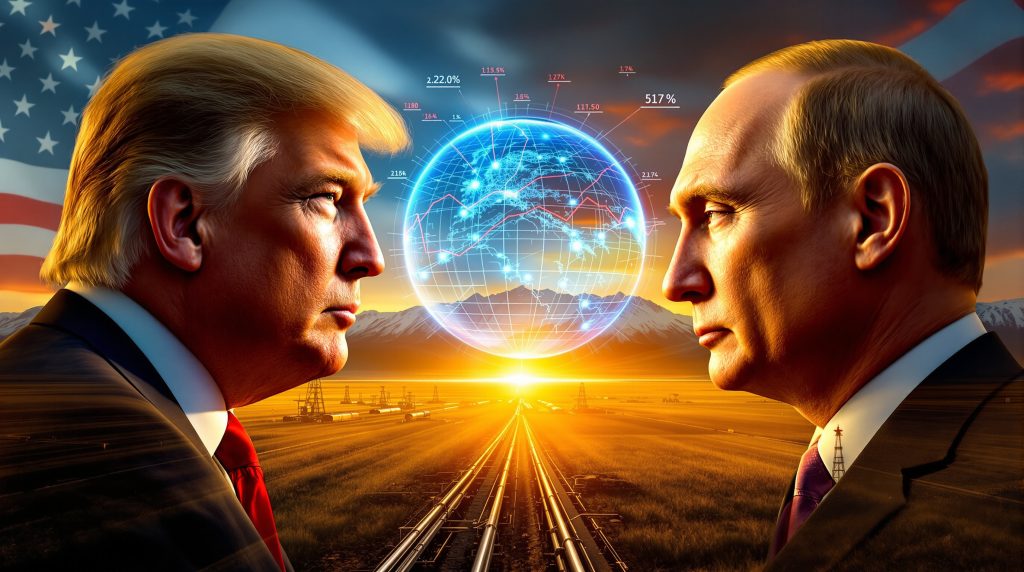How Trump-Putin Talks Could Reshape Global Oil Markets
The geopolitical landscape of energy markets is constantly evolving, with diplomatic relationships between major powers often serving as critical pivot points for global oil prices and supply chains. Potential high-level diplomatic engagements between world leaders can create both uncertainty and opportunity for market participants worldwide. Trump-Putin talks have historically shown potential to dramatically influence oil price movements through shifts in policy and international relations.
The Significance of High-Level Energy Diplomacy
When major energy-producing nations engage in diplomatic discussions, the implications extend far beyond politics. These talks have historically represented pivotal moments for energy markets for several compelling reasons:
- They can trigger immediate market sentiment shifts affecting price volatility
- They potentially reshape international sanction regimes impacting oil flows
- They may lead to new production agreements between major energy powers
- They often signal shifts in geopolitical alignments affecting energy security
Energy market participants typically monitor potential outcomes of such discussions closely, particularly when they involve nations central to global energy production and transit.
Market Sensitivity to Diplomatic Developments
Oil markets demonstrate clear sensitivity to high-level diplomatic engagements, with price movements often reflecting trader expectations about potential outcomes:
- Risk premiums for supply disruptions may fluctuate significantly
- Traders price in possible sanctions relief that could increase global supply
- Opposing viewpoints create market division between bulls and bears
- Technical trading patterns sometimes break on diplomatic news
This price action reflects the complex calculations facing traders who must balance diplomatic possibilities against geopolitical risks. Any significant oil price rally could be triggered by positive diplomatic breakthroughs, while deteriorating relations often lead to market anxiety.
Key Oil Market Issues in International Diplomacy
Several critical energy market concerns typically dominate the agenda when major powers engage in diplomatic discussions, with potential for significant impact on global oil supply and demand dynamics:
Sanctions Relief and Energy Export Policies
International sanctions on major oil producers create complex trade flows and price distortions in global markets. Any relaxation could:
- Increase legitimate oil exports to previously restricted markets
- Reduce steep discounts on sanctioned crude currently enjoyed by certain buyers
- Normalize shipping and insurance costs for previously restricted cargoes
- Potentially lower global oil prices through increased market supply
According to recent analysis from PBS, Putin has indicated the Trump administration appears more receptive to Russia's position on several key issues, which could potentially impact energy export policies.
Conflict Resolution and Energy Infrastructure
Ongoing conflicts damage critical energy infrastructure and disrupt traditional supply routes:
- Pipeline systems through conflict zones remain vulnerable to military action
- Maritime shipping routes face security challenges in contested waters
- Conflict resolution could restore confidence in affected energy transit regions
- Rebuilding efforts would require significant investment and coordination
Production Agreement Dynamics
Coordination between major producers represents another crucial dimension:
- Potential realignment of production quota commitments
- Impact on coordination within producer alliances like OPEC+
- Implications for market management strategies
- Possibilities for new production agreements between major producers
Potential Changes in Regional Oil Flows
Geopolitical realignments triggered by high-level diplomatic engagements could fundamentally reshape global oil trade patterns, potentially leading to an oil price stagnation scenario if market uncertainties persist.
Middle Eastern Export Strategies
Gulf producers consistently demonstrate sensitivity to diplomatic shifts:
- Export pricing strategies often adjust to maintain competitive positioning
- Regional producers increasingly diversify export destinations as insurance against volatility
- Infrastructure investments reflect preparation for shifting trade patterns
- Competition for market share intensifies during periods of geopolitical change
Asian Buying Patterns and Price Dynamics
Major Asian importers strategically position themselves amid geopolitical tensions:
- Indian refiners frequently increase spot tender activity during uncertainty
- Chinese buyers maintain selective purchasing strategies
- Japanese and Korean importers hedge against potential supply disruptions
- Regional price differentials reflect these strategic adjustments
U.S. Export Competitiveness
American crude exports face changing competitive dynamics during diplomatic shifts, with many analysts concerned about potential US drilling decline if geopolitical tensions escalate:
- Export volumes can fluctuate significantly based on arbitrage opportunities
- The economics of U.S. crude shipments to Asia remain particularly sensitive
- Production growth in key basins continues despite export challenges
- Policy shifts can dramatically impact export economics
Production Developments That Amplify Diplomatic Effects
Several significant production developments often coincide with diplomatic engagements, creating compound effects on markets:
Emerging Producer Growth Stories
The rapid expansion of production in emerging oil regions represents a notable non-OPEC growth factor:
- Guyana's oil sector continues its remarkable expansion trajectory
- New production facilities come online with increasing efficiency
- Field development progresses faster than initially anticipated in many cases
- Total production potential continues to expand with new discoveries
Regional Production Challenges
Complex regional situations highlight ongoing energy security concerns:
- Pipeline disruptions create persistent production bottlenecks
- Security incidents keep certain production regions operating below capacity
- Infrastructure investments signal long-term development plans despite challenges
- Major oil companies maintain strategic patience in challenging regions
Policy Shifts on Resource Development
Approaches to unconventional resources continue evolving globally:
- Previously restricted development methods may be reconsidered
- Policy reversals aim to address declining conventional production
- New production technologies open previously uneconomic resources
- Regional energy integration creates cross-border opportunities
Corporate Positioning Strategies
Major energy corporations strategically prepare for potential diplomatic outcomes:
Multinational Operations in Complex Regions
Western energy companies maintain nuanced relationships with assets in geopolitically complex regions:
- Some companies maintain limited operations despite challenges
- Others completely divest from high-risk projects
- New investment decisions await clarity from diplomatic developments
- Corporate risk assessments reflect the uncertainty of geopolitical outcomes
Strategic Acquisitions and Consolidation
Industry consolidation continues amid geopolitical uncertainty:
- Strategic asset acquisitions reflect companies hedging against geopolitical risks
- Portfolio adjustments prioritize political stability and fiscal certainty
- Resource nationalization trends accelerate in several key producing regions
- Companies seek to balance geographic diversification against concentration benefits
Evolving Diplomatic Engagement
Complex international situations demonstrate shifting diplomatic approaches:
- Major oil companies often serve as unofficial diplomatic channels
- Supply agreements reflect broader diplomatic alignments
- Infrastructure investments signal long-term diplomatic commitments
- Corporate strategies increasingly incorporate geopolitical risk analysis
Broader Commodity Market Impacts
Diplomatic developments in oil markets have implications beyond crude, affecting several interrelated commodities:
Natural Gas Market Dynamics
Natural gas flows and pricing face significant potential disruption from diplomatic shifts:
- New pipeline deals reshape regional gas market economics
- Supply security remains a critical concern in import-dependent regions
- Export capacity expansions continue amid geopolitical uncertainty
- Price volatility increases during periods of diplomatic uncertainty
Critical Minerals and Metals
Strategic materials markets demonstrate sensitivity to geopolitical developments:
- Rare earth exports fluctuate based on diplomatic tensions
- Precious metals prices often surge amid geopolitical uncertainty
- Industrial metals face complex supply chain challenges
- Battery material markets remain particularly vulnerable to diplomatic shifts
Agricultural Commodities and Food Security
Food security concerns intersect with energy geopolitics:
- Global food prices demonstrate sensitivity to energy input costs
- Vegetable oil and meat prices correlate with broader commodity trends
- Energy costs significantly impact agricultural production economics
- Fertilizer availability and pricing remain sensitive to natural gas markets
Potential Diplomatic Outcomes and Market Implications
Market participants should prepare for several possible scenarios following major diplomatic engagements:
Scenario 1: Significant Diplomatic Breakthrough
A comprehensive agreement could dramatically reshape energy markets:
- Sanctions relief for previously restricted energy exports
- Coordinated approach to global production management
- Stabilization of disrupted transit routes
- Potential downward pressure on global oil prices
Scenario 2: Limited Progress and Continued Uncertainty
Partial agreements without comprehensive resolution would maintain market tensions:
- Selective sanctions relief for specific energy sectors
- Continued uncertainty regarding conflict resolution
- Persistent risk premiums in global energy pricing
- Regional price dislocations and trade flow distortions
Scenario 3: Diplomatic Failure and Escalation
A breakdown in talks could trigger significant market volatility and potentially an oil price crash as diplomatic relations deteriorate. According to reporting from The Guardian, Trump-Putin talks have yet to yield concrete action on several fronts, creating continued uncertainty for markets.
- Potential strengthening of existing sanctions regimes
- Heightened energy security concerns in vulnerable regions
- Price spikes reflecting increased geopolitical risk
- Accelerated efforts to reduce dependency on affected energy sources
Strategic Approaches for Market Participants
Energy market stakeholders should consider several strategic approaches when navigating diplomatic uncertainty:
Risk Management Strategies
Uncertain outcomes demand robust risk management:
- Hedging exposure to price volatility through financial instruments
- Diversifying supply sources and transportation routes
- Maintaining operational flexibility to adapt to changing conditions
- Stress-testing business models against multiple geopolitical scenarios
Investment Implications
Capital allocation decisions should reflect the range of potential outcomes:
- Evaluating infrastructure investments with appropriate geopolitical risk premiums
- Considering political risk insurance for vulnerable assets
- Balancing short-term opportunity against long-term strategic positioning
- Identifying potential winners and losers across the energy value chain
Policy and Regulatory Monitoring
Regulatory frameworks may shift rapidly following diplomatic developments:
- Tracking sanctions implementation and enforcement mechanisms
- Monitoring export control regimes and licensing requirements
- Assessing compliance obligations across jurisdictions
- Preparing for potential regulatory divergence between major economies
Navigating Uncertainty in Global Energy Markets
Major diplomatic engagements represent pivotal moments for global energy markets. While immediate price impacts remain uncertain, the long-term implications for trade flows, investment decisions, and geopolitical alignments will likely be substantial.
Market participants should prepare for increased volatility while maintaining strategic flexibility to capitalize on emerging opportunities. The complex interplay between diplomatic engagement, market fundamentals, and policy frameworks will continue to shape global energy markets long after the conclusion of high-profile talks.
As the energy transition progresses amid geopolitical realignment, the ability to navigate uncertainty while maintaining strategic clarity will separate successful market participants from those caught unprepared by rapidly changing circumstances.
Want to Capitalise on the Next Major Mineral Discovery?
Stay ahead of the market with Discovery Alert's proprietary Discovery IQ model, which instantly identifies significant ASX mineral discoveries and translates complex data into actionable investment insights. Explore our dedicated discoveries page to see how historic mineral discoveries have generated substantial returns for early investors.




